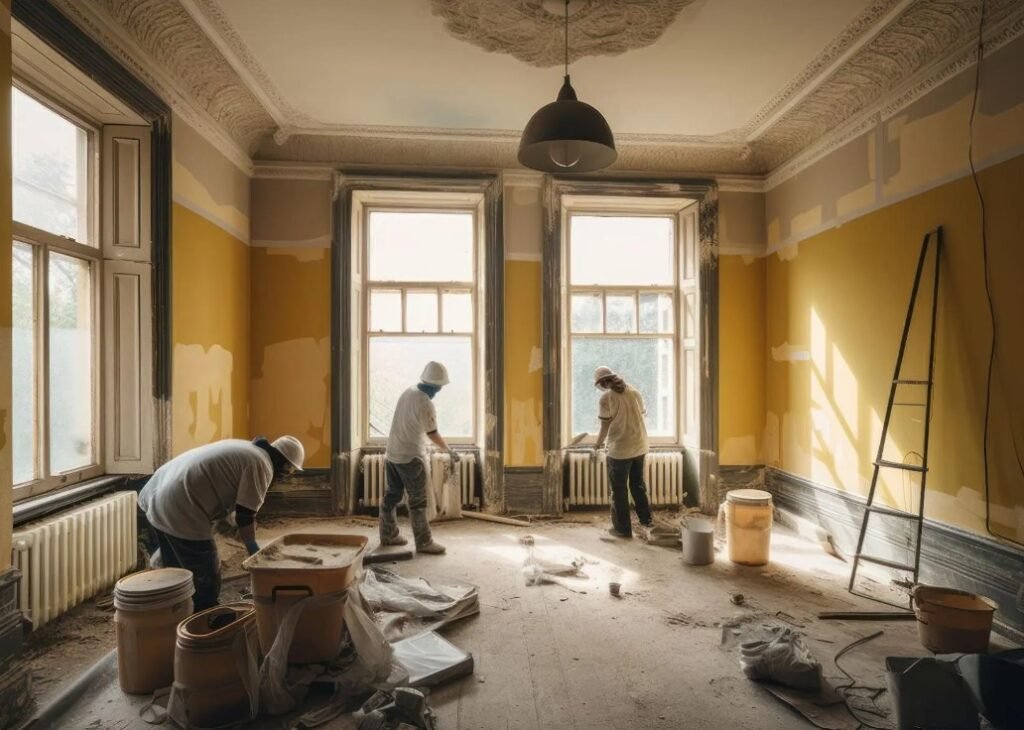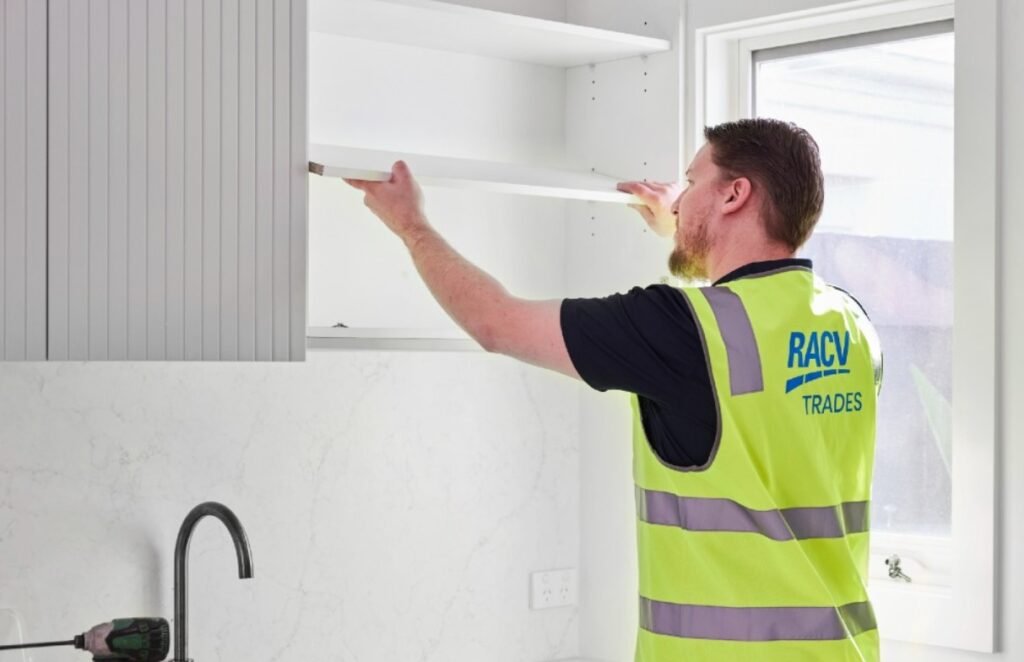This article aims to provide information on When Can A Tenant Return To Property After Remodels? So, are you curious about how many days you can move back in after the remodel? Wondering how long repairs will take? The right timing helps plan better. Learn when it is safe to return to your rental!
When Can A Tenant Return To Property After Remodels?
Tenants are allowed back when the work is 100 percent completed and when the dwelling becomes safe. The tenant must be assured that all these repairs shall conform to local codes. That is if they get cleared by relevant inspections. And the tenant must receive an exact move-back date. Safety checks are always in order prior to readmission.

Factors That Affect When Tenants Can Return
- Time and frequency will depend on which remodeling is being made; most of the smaller remodels, such as repainting, can see them come back sooner, whilst big remodels take even more time.
- Permits and inspections also play in it; they have to pass those before the house will allow the tenant inside the home. Any setbacks by labor or material cannot get any sooner. That would leave the landlord clueless without the tenant so constant contact between the both.
- Weather conditions also impact how fast the renovation is completed especially for exterior projects.
- Structural changes where plumbing or electrical lines are also a part of the remodel cannot be considered complete by a tenant before inspections would guarantee safety.
- Some safety regulations are very stringent, and there is a requirement in place that cannot allow landlords to let the tenant continue occupation of the premises without strict compliance with such standards. Major renovation requires provision for temporary accommodation for the tenant. Overall, scope and local regulation determine when tenants can return.
Types Of Property Renovation
Renovations and modifications can be as simple as repainting the walls and changing the carpets to intense tasks such as rewiring the house or remodeling all the plumbing.
Cosmetic renovations cause minimal disruption and sometimes even allow the tenants to stay on-site or return shortly.
Structural renovations take more time and sometimes require permits and inspections. Some are renovated purely on the look of the property, while others make it a safer or even more energy-efficient place.
Landlords can renovate to add value, perhaps redoing a new kitchen or bathroom. Structural renovation may take several weeks or even months depending on how old the property is, or more extensive remodeling before it becomes safe enough to let the tenants back in.
Communication regarding timelines of any renovation and what to expect about impacts will make this an easier process. Types of renovation can help them predict just how long they’ll be out.
Can A Tenant Stay In The Property During A Remodel?
Less extensive projects such as repainting or some fixing inside the house may allow the tenant to remain in the house, but more extensive re-model works that involve electric work or plumbing may necessitate the tenant to vacate the house for some time.
Safety and habitability of the unit remain the responsibilities of the landlord. If it is impossible to stay, landlords should offer some form of temporary shelter or pay for the temporary accommodation.

Some tenets may agree to stay if only a few rooms or areas are undergoing renovation. A kitchen is for instance undergoing renovation, and they will use a temporary setup.
The landlords should therefore communicate the scope of the project and the possible inconveniences beforehand. Another case is that in some regions, legislation requires landlords to provide alternatives during the complete remodel. Lastly, this decision is guided by tenant safety and comfort.
Can A Tenant Remodel A Rented Apartment For Rental Purposes?
Some landlords are willing to accept changes that benefit the property. Some are quite easy, such as shelves and curtains. The more structural changes, however, require strict guidelines. The whole process would tell you if changes are done without permission; sometimes, the landlords may insist that they turn it around to how it was before.
Opening up communication with your landlord and the avoidance of misunderstandings between them keeps in mind the whole essence of keeping the place neat for the next people living there.
Although some changes, such as painting and installing fixtures, are slight, they will change the apparent value of a property along with its aesthetic appeal. Unless permission is granted, the tenant loses his deposit or is actually evicted from the said property.
In any case, it is best that one asks his landlord if he wants a certain sort of remodel done. These landlords prefer being in the driver’s seat when matters of changing properties are under discussion.
Can My Landlord Make Me Move Out For Repairs Or Renovations?
Sometimes the landlord can demand temporary move-outs if the repairs would otherwise be too extensive. These laws apply when the condition under which the property rendered becomes deemed unsafe to continue existing.
The landlord must include within the notice any amount of time he anticipates he will require to take on these repair measures and may offer re-located accommodations or a diminishment of rent. It really depends on the local law as in some areas, they state what is and isn’t allowed.
Tenants’ rights also include the need for notice to be given in case of a possible eviction. Restorations undertaken must also cause minimum inconveniences to tenants; evictions for renovative purposes are not usually permitted unless valid reasons exist to effect this.
In these instances, dwelling in unrenovated rooms or other premises might be tolerated by mutual agreement with the landlord. Should an eviction become inevitable, a likely claim could be reimbursement for relocation costs.
Can A Tenant Request Changes Or Modifications To A Rental Property From Their Landlord?
Tenants can request that the landlord paint or modify fixtures, but the landlord is not typically required to do this. More value-adding updates such as prospective updates to meet future tenant needs will likely be allowed by the landlord.
Requests for special needs, such as a disability modification, should be discussed ahead of time. Debating changes often helps set a positive rapport between the landlord and the tenant.

For larger changes, landlords might take into account the expense and how that might impact property value. Cosmetic, and aesthetically related upgrades could also become the responsibility of the tenant.
When a landlord is amenable to making modifications, it’s a good practice to have those conditions in writing to prevent confusion. Lastly, all changes must meet lease standards and keep properties up to standard.
What Can A Person Do If Their Landlord Wants To Remodel While The Tenant Still Lives There?
They can also insist on special facilities, including flexible hours of work or minimal utilization of the building. If such renovation impacts the lifestyle of the tenant, negotiation of the tenancy terms can be effective.
Some regulatory systems respect the rights of tenants regarding renovation. In this case, the landlord must avail certain facilities. Communication between the tenants and landlords makes it much easier to control the renovation process.
If there are in-place tenants whom the landlord has to remodel, then there needs to be open communication. These tenants may request the timeline, scope, and any possible disruptions that may occur in their lives.
They can further request that they be given a temporary rent reduction or alternative accommodation when the renovation is extensive. Safety is paramount; tenants should thus state any issues about possible hazards on the premises.
Can My Landlord Evict Me To Make Renovations?
Generally, there cannot be eviction by a landlord due to renovation needs as well, especially at a midterm stage. Nonetheless, after serious damage to the property like a house or real estate, residents may sometimes need to be temporarily evacuated when no habitation is possible.
This kind of case usually envisages a pre-notice to the tenant and, depending on the case, some kind of compensation or alternative accommodation. Eviction for renovation for reletting is generally unlawful.
A tenant can appeal the eviction notice if the landlord is looking to evict them for minor updates. They may consult an attorney or discuss reasonable options, such as negotiating timelines.
In some jurisdictions, landlords are barred from evicting tenants about updates not intending to increase rent. Now one should understand rental laws within their jurisdiction so they can fight for this right when under an eviction.
Can You Evict When Selling Or Renovating Your Rental?
A landlord is permitted to evict his tenants for either sale or renovation purposes based on the jurisdiction. The sale of premises does not necessarily imply that tenants need to be forcibly ejected as leases may be transferred to the selling owner.
Acceptable only if the renovation project makes the unit uninhabitable, the renovation would generally fall under local eviction laws as well as reasonable notice.

If an eviction must occur before a sale, landlords should respect the end of a lease term or pay off their tenants. Tenants should seek local law to see what they are entitled to when the lease is up.
Communications with landlords will enable the entire process to be smooth for larger leases. If the tenancy is properly understood by the locality, then a tenancy will be treated appropriately in case it is sold or improved.
What Are The Tenant’s Rights If A Landlord Decides To Sell The Property?
In general, the right of tenancy will remain enforced throughout the current lease even in instances where a landlord has made decisions to sell the building. The buyer is bound to respect this lease and see out the terms of the previous lease until it expires.
Tenants are entitled to notice from the seller concerning the sale of the property and even changes in their contact details in the period. Usually, a tenant may continue to stay as long as the lease.
The length of notice that a tenant must be given before vacating will depend on the nature of the lease and local legislation. Tenants may not be requested to vacate without giving proper notice. In some regions, tenants have the right of first refusal before allowing other buyers to purchase the property. With such rights, the tenants feel secure in the sale.
Are There Alternatives To Eviction If The Landlord Wants To Renovate The Property?
Instead of eviction, sometimes the options available to landlords are temporary relocation so tenants help cover over the intervals of renovation. Rent adjustment, hotel stays, or alternative temporary housing could be offered.
This way, tenants might come back after the remodel without having to relocate fully. Good communication serves both parties to agree on solutions as well as respect tenant rights.
The landlord may also have the urge to implement phased renovations, where one unit or section at a time is renovated to minimize the displacement of the tenants.
In other areas, some legislations require the landlords to exhaust all avenues before evicting. This means that the tenants have to be proactive with their landlord in discussing these avenues so they can keep their housing stable.
Can My Landlord Make Me Move Out For Repairs In Ohio?
A landlord in Ohio can request the tenant vacate temporarily, particularly during massive repairs, but that should be done with adequate notice.
Tenants should be mandated to vacate only if the made repairs rendered the property unsafe or habitable. A landlord should provide alternative housing or relief in rent during that period. Minor repairs will seldom request a move-out.

In the state of Ohio, it is unlawful for a landlord to perform repairs that would result in more inconveniences to a tenant. Thus, in this instance, it becomes important to obtain the services of an attorney where unreasonable threats to leave the house are issued to the tenant.
Notice and communication are to be transparent, in writing, and will help both parties know their rights and responsibilities. Tenants are covered under the law during a landlord’s renovation process.
Can A Landlord Renovate During A Lease In Ontario?
The right of the tenant is under certain circumstances to be allowed by the landlord in Ontario to redevelop a property while there is tenancy. However, the tenant’s safety is ensured, and also must receive adequate advance notice of the works to be undertaken.
The tenant may have to be relocated at some expense should the renovations call for temporarily vacating him/her from the house. In this regard, there is a possible reduction of rent or compensation. A minor renovation seldom results in the eviction of a tenant.
The Ontario Residential Tenancies Act provides several rights to the tenant, for example, it provides the right to return after renovation, say if the house is being renovated.
The tenants must be communicated exactly how long that would take and the inconvenience this may cause. In case a landlord is found renovating excessively, the tenants may contact the Rental Board of Ontario. This helps protect the tenants during the times that a property is under upgradation or repair.
Conclusion
After the remodel work is done and safe for them to live again, they will be able to move back into the property. The needed inspections pass through all applicable required checks to ensure a smooth return for the tenant once both parties agree on when the tenant will be able to move back into the property.
Most often, it will be so that the minor works pay back faster whereas the major works will require a waiting period more than that of the tenants. Safety and habitability take precedence in most such scenarios. By understanding all these aspects, tenants along with landlords, can successfully shift after remodeling jobs.
Frequently Asked Questions
How long will tenants have to wait after remodeling?
Tenants may return when the work is over and will pass inspection criteria.
Should tenants wait until inspections take place?
Yes, any inspections required are passed before tenants may return.
Can a tenant return with minor repairs?
With minor repairs, tenants may remain or return earlier if it is safe.
Who decides when the tenant can return?
The landlord shall communicate with the tenants to confirm, that safety and inspection are okay.
What if it takes longer than expected time to redo?
The landlord shall inform the tenant that temporary lodging facilities can be provided when it is needed.
